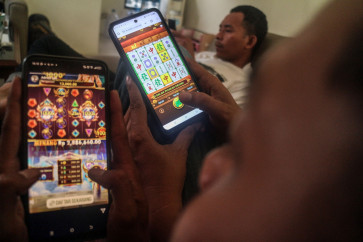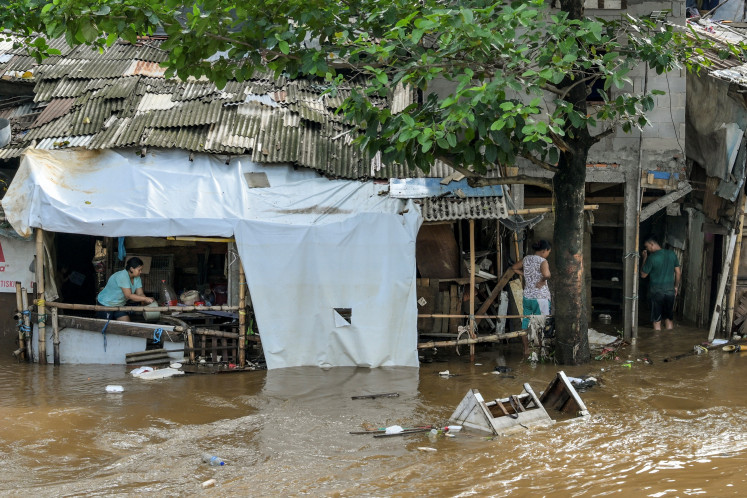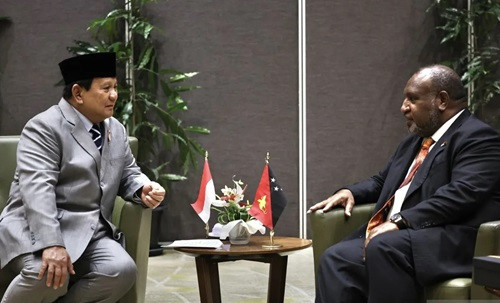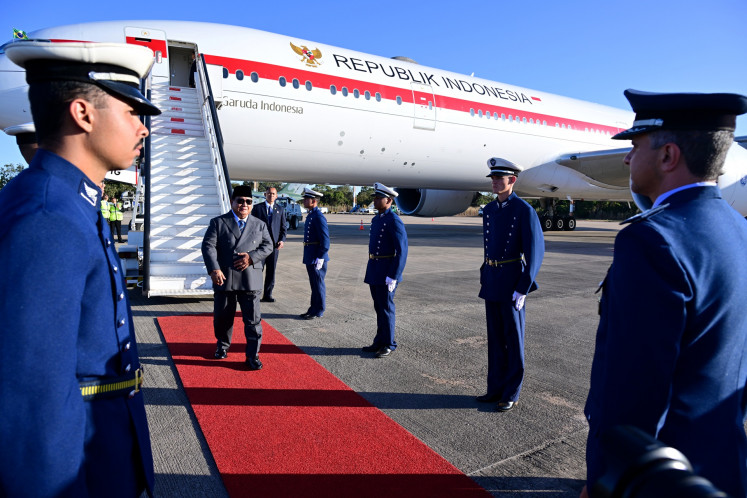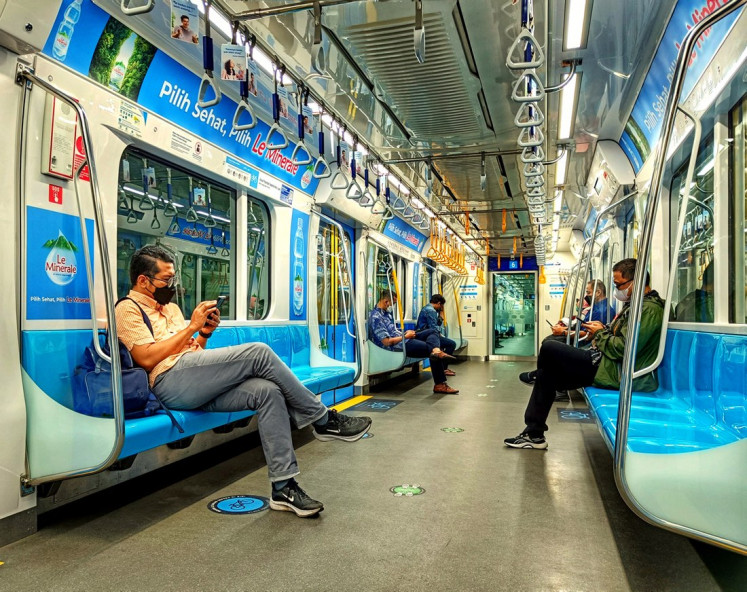Popular Reads
Top Results
Can't find what you're looking for?
View all search resultsPopular Reads
Top Results
Can't find what you're looking for?
View all search resultsIndonesia in good position to revive world pressure on Myanmar
Any international economic sanction is unlikely to work as Myanmar has shown when it was in isolation for 50 years. And now Myanmar has China’s support apart from other economic partners.
Change text size
Gift Premium Articles
to Anyone
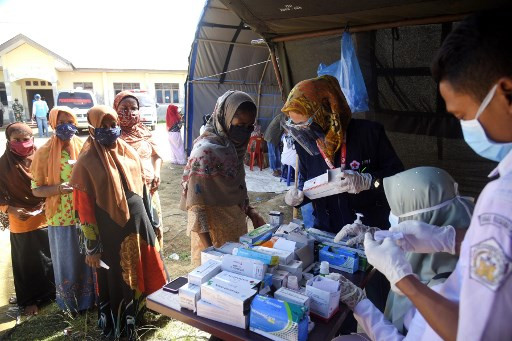 This picture taken on Sept. 9, 2020 shows a group of Rohingya women queueing up for medical check-ups at a transit camp after nearly 300 Rohingya migrants came ashore on the beach in Lhokseumawe on the northern coast of Indonesia's Sumatra island. When hundreds of Rohingya paid traffickers to escape their squalid refugee camp in Bangladesh earlier this year they were promised they were just a week away from a new life in Malaysia. Instead, the group of mostly women and children suffered more than 200 days of terror on the high sea until they landed this week on Indonesia's northern coast. (AFP/Rahmat Mirza)
This picture taken on Sept. 9, 2020 shows a group of Rohingya women queueing up for medical check-ups at a transit camp after nearly 300 Rohingya migrants came ashore on the beach in Lhokseumawe on the northern coast of Indonesia's Sumatra island. When hundreds of Rohingya paid traffickers to escape their squalid refugee camp in Bangladesh earlier this year they were promised they were just a week away from a new life in Malaysia. Instead, the group of mostly women and children suffered more than 200 days of terror on the high sea until they landed this week on Indonesia's northern coast. (AFP/Rahmat Mirza)
T
he latest batch of Myanmar’s Rohingya minority refugees landed in Aceh recently, prompting ASEAN in its ministerial meeting last week to urge and express readiness to help Myanmar to work out its plan to repatriate the refugees.
Also last week, eight countries including the United States, the United Kingdom, France and Germany urged Myanmar to immediately enable “safe, voluntary, sustainable and dignified return of refugees”, and to comply with the orders of the International Court of Justice, which in January had ordered Myanmar to prevent genocide against the Rohingya.
In fact, however, international pressure on the Rohingya issue has decreased, among other things, since the replacement of Yanghee Lee, the United Nations special rapporteur for Myanmar, whose term ended in early 2020. Without multilateral support, Bangladesh, which hosts around 1 million Rohingya refugees, feels alone, and has resorted to bilateral arrangements with Myanmar, including securitizing the issue to mitigate extremism and preventing the Rohingya refugees from interacting with local society in every way possible.
All this has caused weakened political leadership of the Rohingya to fight for themselves. They need to be empowered.
The four most urgent measures are first, involve the Rohingya in talks on their future, meaning recognizing them as a party; second, mobilize resources and funds to support Bangladesh and improve refugee shelters; third, start the discourse on third countries providing asylum to Rohingya who fear returning to Myanmar; fourth, resume multilateral mechanisms at the United Nations to enable all these measures, to more intensively shine the spotlight on Myanmar’s behavior.
And Indonesia is in a good position to drive all these initiatives given its underused nonpermanent seat on the UN Security Council.
It doesn’t matter if Indonesia’s term ends this December. All is not lost. Indonesia has world credibility. Foreign Minister Retno LP Marsudi would be the world’s foreign minister who has made the most visits to the Rohingya refugees. Through various engagements Indonesia has come to understand that Rohingya are very communal; they don’t want to move individually or with just their own families, but with their entire villages.
So forget for now conventional international mechanisms with individual assessments for refugee placements. No need either to heed allegations of Indonesia’s “Islamic agenda”, as everyone knows our humanitarian motives for neighbors.
What we need is to be creative and active. Creativity without being active is no use and vice versa. We cannot be spectators of one another, but we must coordinate and support each other on the issue.
We need an open mindset, not unrealistic interventions like pushing for a change in Myanmar’s citizenship law, though certainly we follow nondiscrimination principles. And Myanmar’s ally China, even for its own economic interest, has provided funds and transportation for refugees’ safe return.
The demand for citizenship was not even absolute for all refugees as the independent fact-finding mission learned. Some just wanted to return and live safely as their first priority, likewise hundreds of thousands of Rohingya who are still in Myanmar. Now it’s difficult for refugees to return as their homes and villages have been bulldozed.
Making demands or appeals at Myanmar is no use. What’s needed is effective interaction between the UN secretary-general, the UN special rapporteur for Myanmar and the secretary general’s special envoy for Myanmar. These are the forces that could effectively push the Security Council in Geneva and the General Assembly in New York to pressure Myanmar.
It is not possible either to expect ASEAN’s strong role as it safeguards its unity, and it’s also dependent on New York and Geneva. Efforts are really needed, mainly from Indonesia, for if persecution of the Rohingya continues it is very possible that minorities in any country particularly in Southeast Asia, who the rulers suddenly decide they do not like, could face discrimination and abuse.
Nonstop pressure against Myanmar is needed as during the term of Prof. Lee such pressure came among others from the European Union, Latin America, Africa and the Organization of Islamic Cooperation.
Any international economic sanction is unlikely to work as Myanmar has shown when it was in isolation for 50 years. And now Myanmar has China’s support apart from other economic partners.
The international community needs to first accept that some of the refugees wish to return and others may want to resettle in Europe or Canada, for instance. Such discourse is still nonexistent as all parties are insisting on safe repatriation, with Indonesia jumping on the wagon too.
In the 1970s, Indonesia and France were involved in international cooperation in assisting refugees from Vietnam on Galang Island in Riau province. Why don’t we continue such arrangements? Many look to Indonesia’s experience because that was extraordinary.
***
Former Indonesian attorney general, who chaired the United Nations-appointed Independent International Fact-finding Mission on Myanmar in 2018. The article is based on a recent interview by Ati Nurbaiti, formerly of The Jakarta Post.


